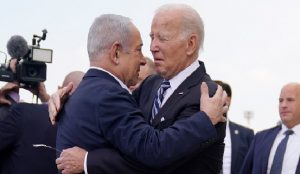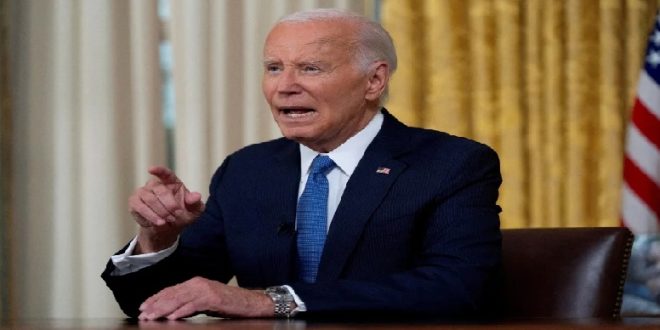28-09-2024
WASHINGTON: US efforts to secure a Gaza ceasefire remain stalled after nearly a year of fighting. Iran-backed Houthi rebels continue to attack Red Sea shipping and now, despite intense US-led diplomacy, the Israel-Hezbollah conflict threatens to flare into an all-out regional war.
 With the clock ticking on his administration, US President Joe Biden faces an arc of Middle East crises likely to defy solution before he leaves office in January and which look all but certain to tarnish his foreign policy legacy, analysts and foreign diplomats say.
With the clock ticking on his administration, US President Joe Biden faces an arc of Middle East crises likely to defy solution before he leaves office in January and which look all but certain to tarnish his foreign policy legacy, analysts and foreign diplomats say.
Biden has struggled over the past year to thread the needle of embracing Israel’s right to self-defense against Palestinian Hamas militants in Gaza and the Hezbollah group in Lebanon while trying to contain civilian casualties and prevent a spiral into a broader Middle East conflict.
Time and again he has confronted the shortcomings of that strategy, the latest being Israel’s rejection on Thursday of a US-backed proposal for a 21-day truce across the Lebanon border as it pressed ahead with strikes that have killed hundreds of Lebanese.
“What we’re seeing are the limits of US power and influence in the Middle East,” said Jonathan Panikoff, the US government’s former deputy national intelligence officer for the region.
Perhaps the clearest example of that trend has been Biden’s reluctance to exercise much US leverage as Israel’s top arms supplier and diplomatic shield at the United Nations to bend Israeli Prime Minister Benjamin Netanyahu to Washington’s will.
For nearly a year the United States has sought unsuccessfully to help broker a deal between Israel and Hamas to halt the fighting and free hostages taken by the militants in their Oct. 7 cross-border rampage that triggered the Gaza war.
No breakthrough is imminent, say people familiar with the matter.
US officials are quick to pin blame for failed negotiations on Hamas but some also cite Netanyahu’s shifting demands.
 During US Secretary of State Antony Blinken’s nine trips to the region since Oct. 7, the top U.S. diplomat several times found himself at odds with senior Israeli leaders.
During US Secretary of State Antony Blinken’s nine trips to the region since Oct. 7, the top U.S. diplomat several times found himself at odds with senior Israeli leaders.
In one instance last November, Blinken at a news conference urged Israel to pause its military offensive in Gaza to allow aid to enter the Palestinian enclave. Moments later, Netanyahu rejected the idea in a televised statement, saying he had made clear to Blinken that Israel was continuing with its operation “full force.”
The White House did not immediately respond to a request for comment for this story.
Biden has been credited by fellow Western leaders with reinvigorating key US alliances, including with NATO and top Asian partners, after his White House predecessor, Donald Trump, questioned the value of such relationships.
That was demonstrated in April when the Biden administration marshalled support from regional and European partners to help defend Israel from an Iranian drone and missile attack but some foreign diplomats say Biden’s handling of the volatile Middle East, especially his response to the Gaza war, has frayed US credibility abroad.
“President Biden’s original blunder was to say the US will, no matter what, stand for Israel,” one Western official said. “We have never recovered from that.”
A Middle East diplomat said US diplomacy had “failed to impress adversaries” and noted that Biden sent military assets to the region after Oct. 7 as a warning to Iran and its proxy groups but that it did not seem to deter them completely.
Yemen’s Iran-backed Houthi rebels have kept up a steady barrage of missile attacks on commercial shipping in the Red Sea despite Biden and other Western leaders providing warships for beefed-up protection. (Int’l News Desk)
 Pressmediaofindia
Pressmediaofindia




